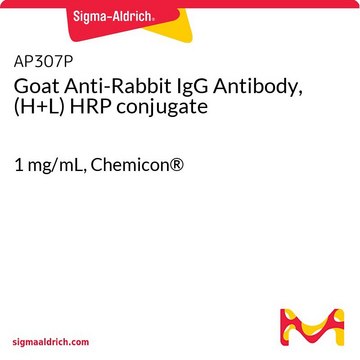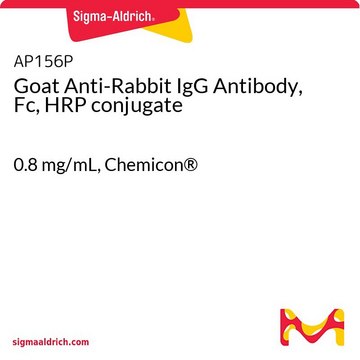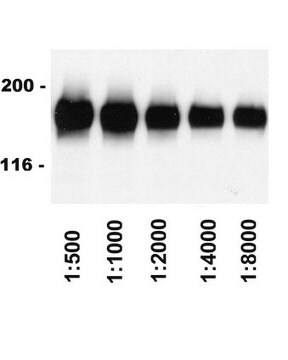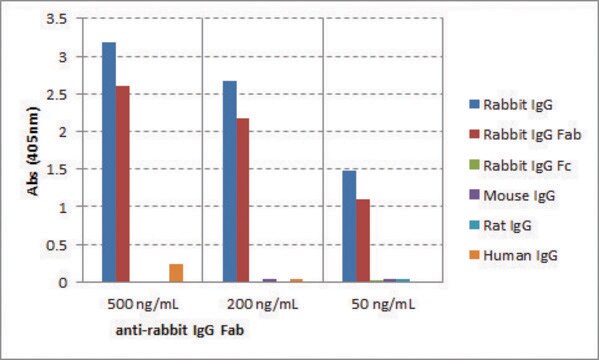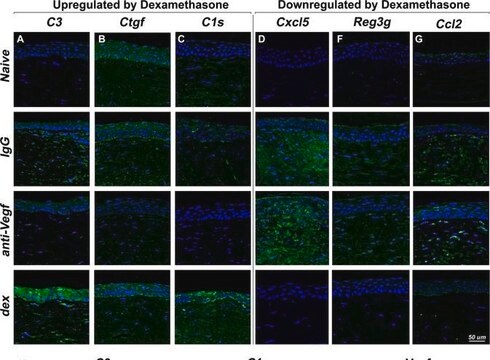AP510P
Sheep Anti-Rabbit IgG Antibody, HRP conjugate
1 mg/mL, Chemicon®
Sign Into View Organizational & Contract Pricing
All Photos(1)
About This Item
UNSPSC Code:
12352203
eCl@ss:
32160702
NACRES:
NA.46
Recommended Products
biological source
sheep
Quality Level
conjugate
peroxidase conjugate
antibody form
purified antibody
antibody product type
secondary antibodies
clone
polyclonal
species reactivity
rabbit
manufacturer/tradename
Chemicon®
concentration
1 mg/mL
technique(s)
western blot: suitable
shipped in
wet ice
target post-translational modification
unmodified
General description
Immunoglobulin G (IgG) is part of the family of glycoprotein immunoglobulins which stage immune responses against pathogenic organisms. IgG contributes to the immune response by mobilizing innate immune effector cells and inducing and pro-inflammatory responses. Such proinflammatory responses are mediated by Fcg receptors which interact with sialylated Fc fragments on IgG molecules. This antibody is processed from Cat. No. AP510, Sheep anti-Rabbit IgG.
Specificity
This antibody reacts with rabbit IgG and rabbit IgG (Fc). There may be minimal cross-reactivity against Human IgG and Rabbit IgM, with minimal to no cross-reactivity against Mouse IgG, Rat IgG, Chicken IgY, Guinea Pig IgG, and Hamster IgG.
Application
Sheep Anti-Rabbit IgG Antibody, HRP conjugate validated for use in western blotting.
Quality
Evaluated by Western Blot in Rabbit IgG recombinant protein.
Western Blot Analysis: 0.1 µg/mL of this antibody detected Rabbit IgG in 0.5 µg of Rabbit IgG recombinant protein.
Western Blot Analysis: 0.1 µg/mL of this antibody detected Rabbit IgG in 0.5 µg of Rabbit IgG recombinant protein.
Target description
~53 kDa observed
Physical form
Purified sheep polyclonal in buffer containing PBS, StabilZyme® HRP Conjugate Stabilizer, and 0.05% ProClin 150.
Analysis Note
Control
Rabbit IgG recombinant protein
Rabbit IgG recombinant protein
Legal Information
CHEMICON is a registered trademark of Merck KGaA, Darmstadt, Germany
StabilZyme is a registered trademark of SurModics, Inc.
Not finding the right product?
Try our Product Selector Tool.
Signal Word
Danger
Hazard Statements
Precautionary Statements
Hazard Classifications
Aquatic Chronic 3 - Repr. 1A
WGK
WGK 2
Flash Point(F)
Not applicable
Flash Point(C)
Not applicable
Certificates of Analysis (COA)
Search for Certificates of Analysis (COA) by entering the products Lot/Batch Number. Lot and Batch Numbers can be found on a product’s label following the words ‘Lot’ or ‘Batch’.
Already Own This Product?
Find documentation for the products that you have recently purchased in the Document Library.
Ryan J Bloom et al.
Nature methods, 11(11), 1147-1153 (2014-09-15)
Synthetic genetic circuits incorporating regulatory components based on RNA interference (RNAi) have been used in a variety of systems. A comprehensive understanding of the parameters that determine the relationship between microRNA (miRNA) and target expression levels is lacking. We describe
Chenfei He et al.
Autophagy, 17(11), 3577-3591 (2021-02-05)
Scavenger receptors are pattern recognition receptors that recognize both foreign and self-ligands, and initiate different mechanisms of cellular activation, often as co-receptors. The function of scavenger receptor CD36 in the immune system has mostly been studied in macrophages but it
Yurika Matsui et al.
DNA and cell biology, 38(1), 91-106 (2018-11-22)
The considerable amount of experimental evidence has defined the Hippo pathway as a tumor suppressive pathway and increased expression and/or activity of its oncogenic effectors is frequently observed in cancer. However, clinical studies have failed to attribute cancer development and
Our team of scientists has experience in all areas of research including Life Science, Material Science, Chemical Synthesis, Chromatography, Analytical and many others.
Contact Technical Service
